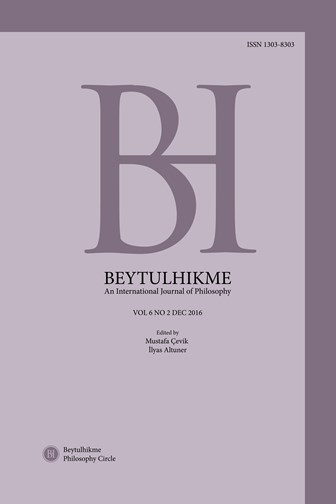Author :
Abstract
İkinci dönem Wittgenstein’ın “mitolojik” ve soyut kural teorilerini ortadan kaldırmakta başarılı olup olmadığı hala tartışılagelen bir konudur. Sorun mühimdir, zira kural takibi kavramı ile alakalı olarak Wittgenstein’ın Platonik, idealist, konvansiyonalist, göreci ve hatta şüpheci görüşlere karşı duruşunu temellendirmektedir. Wittgenstein’ın kapsamlı bir teori ortaya koymakta başarısız olduğu ve hatta takip edilecek hiçbir kuralın mevcut olmadığı gibi septik bir sonucuna vardığı uzun süredir iddia edilmektedir. Bu makalede, kuralın uygulamasını belirleyen zorunlu şartları reddetse dahi Wittgenstein’ın kural mevzusunda septik veya göreci olmadığını iddia etmeye çalışacağım. Bilakis Wittgenstein, pratik temelli bir kural takibi kavramı geliştirir ve klasik nesnel yaklaşımları reddeder. Aslında o kural takibi kavramı ile felsefi tartışmalardaki nesnellik/öznellik, toplum/birey ve zihin/beden gibi temel bazı dikotomileri aşmak ister. Buna ilaveten bireyin kural takibindeki rolünü ve dolayısıyla ahlaki sorumluluğunu vurgular.
Keywords
Abstract
Whether the later Wittgenstein succeeded in destroying “the mythologized” and abstract theories of rule following is still a matter for debate. The question is important because it grounds Wittgenstein’s position against a Platonist, idealistic, conventionalist, relativist and even skeptical views regarding the concept of rule following. It has been argued that Wittgenstein’s views on rule following does not succeed in giving a comprehensive theory. Some even argued that Wittgenstein’s views even leads to a skeptical conclusion that there are no rules to be followed. In this article, I argue that when Wittgenstein rejects necessary conditions that determinate the application of rules, he does not slip into a skeptical position. Rather, he introduces a concept of rule following based on practice, rejecting classical objectivist approaches. Through this concept, in fact, Wittgenstein wants to overcome certain dichotomies such as objectivity/subjectivity, society/i
Keywords
- Arıcı, M. (2015). Zihinsel Alanda “Ben Hissi” Neye Karşılık Gelir? Dört Öğe, 7, 65- 76.
- Aliy, A. (2005). Wittgenstein Felsefesinde Din Dili ve Dinî İman. Çukurova Ün- iversitesi İlahiyat Fakültesi Dergisi, 1, 158-176.
- Alpyağıl, R. (2003). Gramer Olarak Teoloji: Din Felsefesinde Yeni Bir Ufuk. Tezkire, 31-32, 89-105.
- Alpyağıl, R. (2002). Wittgenstein ve Kierkegaard’dan Hareketle Din Felsefesi Yapmak. İstanbul: Anka Yayınları.
- Baker, G. P. & Hacker, P. M. S. (1985). Wittgenstein: Rules, Grammar, and Necessity. Oxford: Basil Blackwell.
- Delice, A. (2013). Kural, Anlam ve Yorum Üçgeninde Wittgenstein. FSM İlmî Araştırmalar: İnsan ve Toplum Bilimleri Dergisi, 2, 101-118.
- Kripke, S. A. (1982). Wittgenstein on Rules and Private Language. Massachusetts: Harvard University Press.
- Medina, J. M. (1998). Wittgenstein in Transition: Meaning, Rules and Practices (PhD. Thesis). Evanston: Northwestern University.
- O’Day, K. (1998). Normativity and Interpersonal Reasons. Ethical Theory and Moral Practice, 1 (1), 61-87.
- O’Neill, M. (2001). Explaining ‘The Hardness of the Logical Must’: Wittgenstein on Grammar, Arbitrariness and Logical Necessity. Philosophical Investigations, 24 (1), 1-29.
- Rees, D. A. (1967). Platonism and the Platonic Tradition. The Encyclopedia of Phi- losophy. New York: Macmillian Publishing Co.
- Rızvanoğlu, E. (2016). Wittgenstein’ın Özel Dil Eleştirisi Bağlamında Kartezyen Geleneğe Itirazı. Posseible, 8, 22-32.
- Sidnell, J. (2003). An Ethnographic Consideration of Rule-Following. The Journal of the Royal Anthropological Institute Incorporating Man, 9 (3), 429-445.
- Verheggen, C. (2003). Wittgenstein’s Rule Following Paradox and the Objectivity of Meaning. Philosophical Investigations, 26 (4), 285-310.
- Williams, M. (1999). Wittgenstein, Mind and Meaning: Toward a Social Conception of Mind. London: Routledge.
- Wittgenstein, L. (1958a). Philosophical Investigations (trans. G. E. M. Anscombe). New York: Blackwell Publishers.
- Wittgenstein, L. (1958b). The Blue and Brown Books (ed. R. Rhees) New York: Harper & Row Publishers.
- Wittgenstein, L. (1961). Tractatus Logico-Philosophicus (trans. C. K. Ogden). Lon- don: Routledge & Keagan Paul.
- Wittgenstein, L. (1969). On Certainty (trans. Denis Paul & G. E. M. Anscombe). New York: Harper & Row Publishers.
- Wittgenstein, L. (1974). Philosophical Grammar (trans. A. Kenny). Oxford: Black- well Publishers.





